Whatever it is, Richard Linklater’s Boyhood is not quite like anything else. Even the Michael Apted Up series is a different beast, since those are documentaries and this is a self-contained dramatic creation. Just about everyone in the critical world has heaped unstinting praise on it (166 positive reviews vs. two negative ones on Rotten Tomatoes). That it has proved enough of a box office performer for it to be treated as a kind of blockbuster in art film terms is certainly remarkable. This so easily could have been a grand folly by a filmmaker who is no stranger to follies — grand and otherwise. Boyhood is a work that few would even consider undertaking: the story of a boy’s life shot over a period of 12 years — with the same major players in for the duration — that tells its story in vignettes of little more than 10-minute durations each year. Linklater’s attempt is less to tell a story than it is to capture both a life and its times in narrative form. As an idea, it’s … well, on the crazy side. That it works at all is astonishing. That it works as well as it does is almost miraculous.
Setting aside the almost stunt quality of its making (which is hard to do), how good is it really? Is it the “game changer” that has been claimed? Well, since shooting movies over a period of 12 years is unlikely to catch on, I’d say it isn’t. Is it the “greatest coming-of-age” film of all time? I’m hesitant to climb on that bandwagon, because covering a life from 6 to 18 is both more and less than a coming-of-age story — that swath is too broad to conveniently pigeonhole. It has to be taken on its own terms. Is it a great film? Well, maybe — time will tell. It is not without its problems. The acting is often uneven. Linklater’s daughter, Lorelei, who plays Mason’s (Ellar Coltrane) sister, Samantha, is sometimes distractingly shrill (especially early on). Coltrane himself makes up for any acting inexperience by having a likable screen presence. The nature of the film also makes it a rather long affair — 165 minutes — but I don’t think it would work at all were it any shorter. Some of the minor criticisms I’ve read — that it’s sometimes pleasantly observational and other times too story-driven — seem to me to miss the point. Life itself is like this — and that’s what Linklater is after here.
There really isn’t much in the way of a plot. We simply drop in on Mason and his family — and fluctuating extended family — once a year. What drama there is — apart from Mom’s (Patricia Arquette) less-than-stellar choices in husbands, perhaps including Dad (Ethan Hawke) — is largely incidental. It’s mostly in the details — often little things you barely notice, like the obliteration of a children’s growth chart in a rental property — that the film scores its points. Ultimately — like life — it matters very little that the story lacks much in the way of shape, because the individual moments add up to something perhaps even better. And I mean that in terms of this one case. I don’t think I’d care for a steady diet of this approach, but here it works. It evokes memories of one’s own life, even if the specifics are different, and the whole film is infused with a bittersweet quality that stays with you long after the film.
Almost as remarkable as the idea of a filmmaker following the same characters for 12 years is the concept of a filmmaker staying true to such an idea for that same period of time. By this I mean that Richard Linklater isn’t the same filmmaker — or person — that he was in 2002 when this started. A lot of artistic growth — to say nothing of personal events we know nothing about — happened in that time. If the film reflects those changes — and it almost certainly must — it does so smoothly. It does so so smoothly that it always feels like a single film. I think that may impress me more than anything, which is saying something, since there is much here that impresses me — even if I’m not quite as in love with Boyhood as I’m supposed to be. Rated R for language including sexual references, and for teen drug and alcohol use.



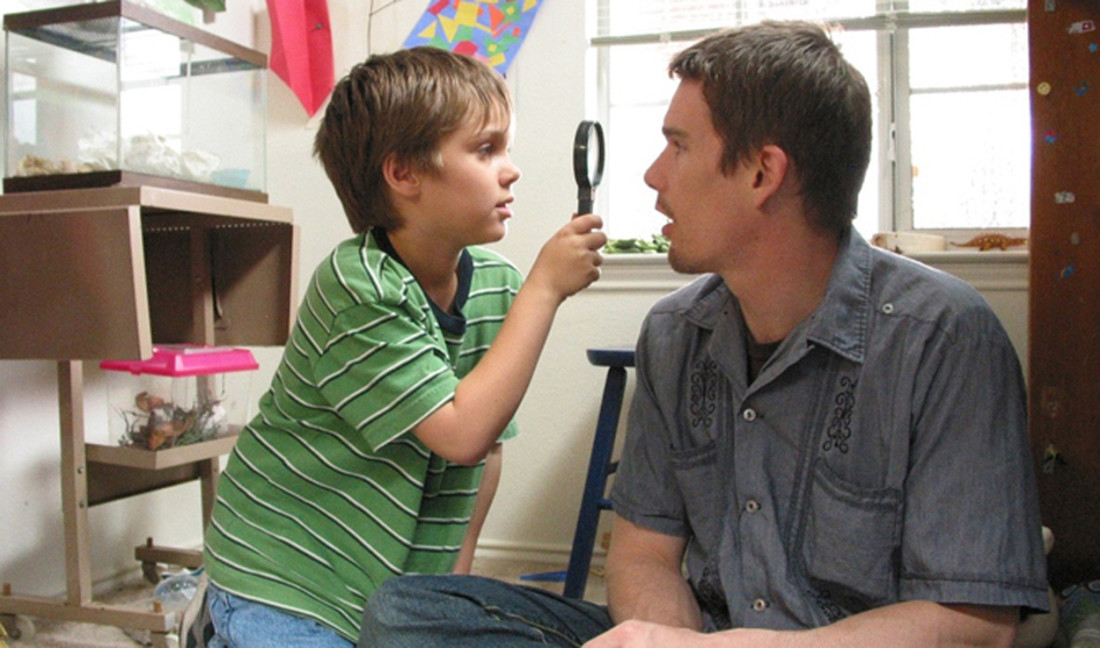
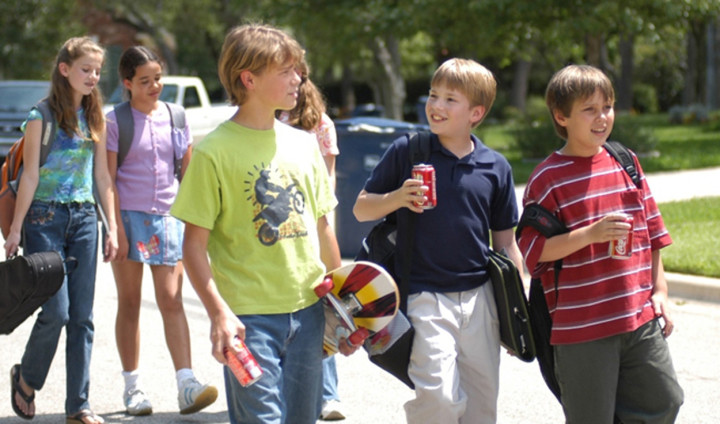
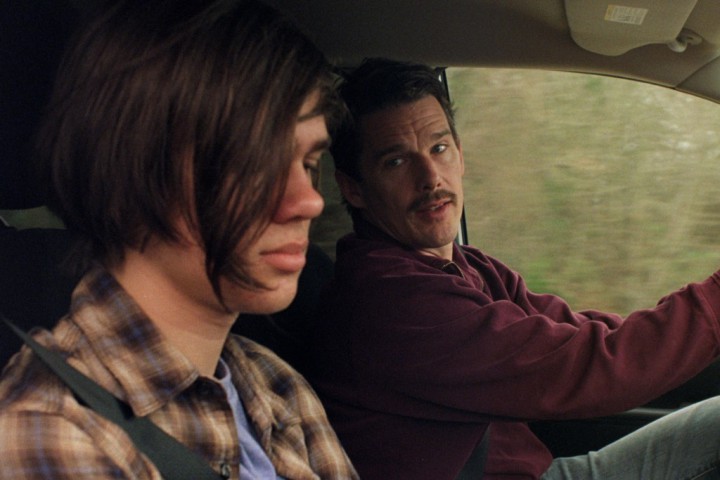
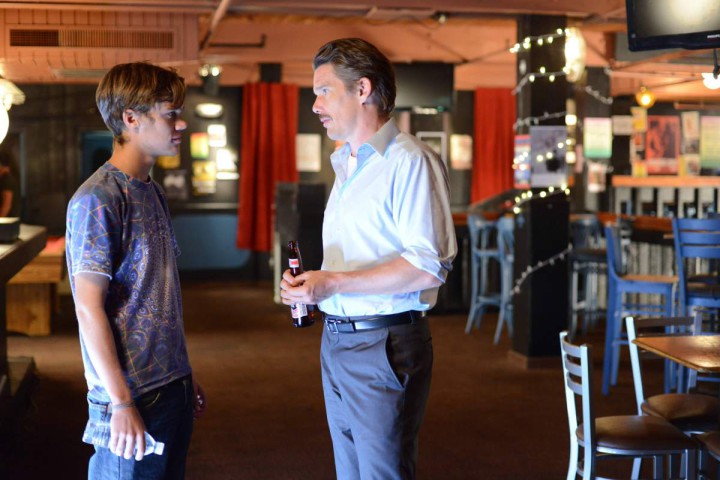
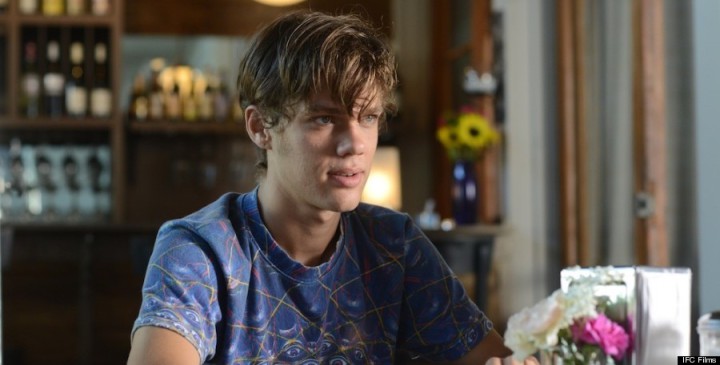
Supplementary material time: here’s a Q&A I did with star Ellar Coltrane last week http://www.citizen-times.com/story/entertainment/movies/2014/08/04/boyhood-star-collaborating-film-ages/13596575/
Nice interview — one you were better suited to than I would have been, not only because you are a true believer, while I am more cautious about completely embracing the film, but because the soundtrack you tackle was almost entirely meaningless to me. I suspect this is generational. The only song in the film I recognized was “Band on the Run” (and that wouldn’t have been my first of even 31st choice from a post-Beatle album).
I am not downplaying the film. I think it’s a fine work that everyone should see, but it resonates more with you than it does with me. But you know that.
Thanks!
I told Ellar that I’d been looking forward to seeing the film since I first heard about it roughly 10 years and he said something like, “Whoa! You were in on it early.” So, yes, that and my general Linklater fondness…and that soundtrack! As the years wore on and I kept recognizing the music, it felt like Linklater and Randall Poster had spied on my iTunes library.
The songs may be a generational perk, but I wonder how much me being close-ish to Mason’s age makes a difference. Elements like the soundtrack have more meaning for Millennials (and perhaps discussions about Star Wars, etc.), but a lot of the occurrences feel universal to being a kid. I think back to the “growing up” montage in The Tree of Life and how little moments like being startled by a baby’s sudden movement, scuffing a knee and petting a cat resonated with me even though the actions were taking place in the ’50s. I don’t think Linklater is working on that level, but it’s close.
You’re also more sold on Tree of Life than I am.
Double win!
In fact, of the two, I’m more sold on Boyhood. And without Tree of Life Besson wouldn’t have stuck dinosaurs in Lucy.
Are you not writing reviews for Ashevegas anymore Edwin?
No, just for the Citizen-Times.
Maybe general *****SPOILERS*****
What a great experience. I think having children helps the viewing experience since you have 2 wells to draw from (one’s own childhood and your experience as a parent). My wife was impressed because of the lack of Hollywood influence on this movie (no implied rapes, main character injuries/assaults/addiction/pregnancy). Loved how Mason Jr. gave a “look”, so aware, of his Mother’s poor choices in men as he met them. So many little treasures from this movie.
Now, if the ladies seated in our row could have been quiet for a few minutes grrr……
I confess to a curiosity about where you encountered this rudery.
And goodness knows, people sure beat a path to this over the weekend!
We saw the film at the Carolina. Thankfully, excessive talking doesn’t happen often these days, but after waiting for some time to see this movie, it did alter the experience.
It’s humorous (not) when the “talkers” decide to sit right behind you in a nearly empty theater and then have the gall to huff when you get up and move.
I confess to a curiosity about where you wouldn’t encounter this rudery.
Maybe I’m deaf, but I don’t encounter this sort of thing very much. And no, unhappy five-year-olds being subjected to Planes: Fire & Rescue don’t count.
Pretty much any time I don’t sit in the way back I hear chatter behind me. The separation between one’s living room and the movie theater is sadly non-existent to many folks.
Of course, I invariably sit in the very back these days, but even when I used to sit further down, I only occasionally had a problem. Sure, there was that woman whose cell-phone started ringing by playing “Dixie” during the exorcism in the 2000 re-release of the longer cut of The Exorcist at the then-Hollywood. And then was the woman who translated The Tenant into Spanish for her companion in 1976 in Florida. And there was the infamous “These people are communists!” woman at in 1981. Plus, there was the pimp behind me in the Times Square theater in 1982 at Conan the Barbarian who cried out, “Bowling for dollars!” when the rubber James Earl Jones head went down the steps. And who can forget “That looks like a gotdamn bear!” being blurted out in thickest redneck at An American Werewolf in London in 1981. But these are extreme (and in the last two cases, excusable, I felt) and pretty isolated — not to mention spread out over a period of about 40 years.
Maybe the talking just bothers me more than most people, but it seems like more and more moviegoers feel the need to comment to their neighbor about the events onscreen instead of processing it internally and saving the discussion for afterward.
My worst experience is still the group of women at Silver Linings Playbook who said “Aww…” in unison whenever anything emotional happened, and that movie is full of emotional moments. That one of the party answered her phone during the screening was no surprise. Then there were the two women behind me at The Bourne Ultimatum. One hadn’t seen the series’ previous two films, so her friend was catching her up on who everyone was and why they were doing what they were doing.
I agree that certain kinds of moments lend themselves to excusable outbursts. Then there are the just plain bad movies where I welcome audience participation after a while. The gentleman shouting, “That’s what you get!” at the antagonists in Trouble With the Curve remains the best thing about that movie.
And the classic “Don’t go near the elevator!” shouted at the hapless doctor who just discovered that Damien had jackal blood in Orlando in 1978 on opening night of Damien: Omen II. Alas, the doctor failed to heed this advice and was soon cleaved in twain by an elevator cable.
Now, some girls went “Ewww” when Ian Sommerhalder and James Van Der Beek kissed in The Rules of Attractio (2002) and the lady I was with turned around and told them, “Oh, grow the fuck up.” Now that needed saying.
I always sit in the very last row. I had the misfortune of a bunch of teens just yelling at the screen and making fun of the movie Her when I seen it.
I can almost understand how that could happen.
I appreciated this a lot more than I actually liked it. I can see why people do love it, and I’m certainly impressed by the ambition and ultimate cohesion of the work, but it just never really engaged me on a stylistic or emotional level. None of the characters are likable or sympathetic for reasons other than that they are people, which, yes, is probably honest and admirable in a lot of ways, but it doesn’t compel me in a way that actually makes me fond of the film. I think it’s probably an important movie and an unabashedly human movie, but it never comes together in a way that makes me feel any affection for it.
I do wonder if my feelings towards BOYHOOD are primarily directed by just how familiar everything in it feels. Great swaths of the film feel ripped directly from my life, right down to repeatedly divorced mother and young Mason’s taste for Dragonball Z and Harry Potter. That I’m just a little bit further along in my life than Mason is in his at the film’s close was also distracting. Many of the similarities are attributable to the era and the film’s inarguable aptitude for capturing normal human life, but the fact that the film often felt like a mirror of my own existence weirdly distanced it from me, especially in the earlier sections.
The film’s overlaps with your life kept you from connecting with it? Please elaborate.
I’m honestly not sure I can explain why I feel that way. The most obvious explanation would likely be that because most of it has an aura of familiarity, the film simply became too mundane fore me to really relate to. I’m probably guilty of using art as escapism more often than I should, and being subjected to what could be scenes from my own childhood prevents that avenue of pleasure. At the same time, I don’t think that adequately explains my reaction, at least not entirely. It could be that the film comes so close to emulating my own experience that, in addition to being somewhat uncomfortable in an admittedly novel manner, it rings false when it so obviously is nothing like my experience in an infinitely varied number of ways. It’s an effect kind of similar to the “uncanny valley” in something like motion capture; it comes so exceedingly close to convincing me that its occasional failures become catastrophic. That’s obviously not the film’s fault given its premise (at least not when it stays away from cliche), but it does take me out of the experience in a way that I can’t prevent. Coupled with the fact that I’m not sure I’m ready to relive or seriously analyze a period of my life that I’ve only recently exited, and any subjective appeal that the film’s similarities to my own life might have had becomes more of a negative than anything. I doubt if any of this is completely fair to the film, even if I would still be pretty disinterested in its characters anyway, but it does bend my outlook.
I do find it interesting that something like THE GRAND BUDAPEST HOTEL can make me feel tinges of nostalgia for places and people that have never existed, while BOYHOOD somehow keeps me from feeling nostalgic for things that I am regularly nostalgic for (though I will admit that the usage of Arcade Fire on the soundtrack affected me more than anything else in the film, likely because I’m a fan of Arcade Fire; the soundtrack in general may have been my favorite aspect of the movie, at least my favorite aspect not related to the audacity of its creation, and for similar reasons). I’m not sure that the ability to be anti-nostalgic is a valueless effect, but it certainly plays a part in hampering my enjoyment of the work.
That all makes sense to me, especially the idea that it is so like your experience and yet so unlike it that it keeps pulling you out of the film. The idea that it touches on things you’re not ready to deal with is interesting. It took me years to become truly comfortable with Women in Love because I see way too much of myself in the Alan Bates character — one aspect in particular — that he overexplains himself so much that he doesn’t get that he’s gone past the point and lost any ground he’s gained and then some. I think I only came to grips with that in the last five years. That’s 30+ years after I first saw it. I still don’t want to see it too often.
I’m pretty much onboard with your first paragraph. Your last sentence, in particular, especially the part about feeling no actual affection for it, seems spot-on with my own feelings. It may well be the best film I’ve seen that doesn’t stand a chance in hell of being on my Ten Best list simply because I have zero desire to ever see it again.
Your second paragraph…I’m completely on the outside looking in. Neither the circumstances, nor Mason’s enthusiasms (good heavens, I’ll be 60 next month; how could they?) reflect my life at all. And I honestly thought that that’s part of the reason why I’m not as keen on the film as I feel I ought to be. I know Edwin thinks the film has a kind of generalized childhood appeal that doesn’t depend of specifics, but I’m not as sold on that, since almost none of the pop culture choices had any relevance for me, and I think it had an impact. Tree of Life — while being a movie I am even less sold on — better captured my memories of what childhood felt like, and I suspect that’s because it physically resembles the era I knew. (Perhaps the moment that is most burned into my brain from it is a child’s view of seeing racially-based police violence and not comprehending what he was seeing. There are lots of moments from my childhood that are like that, though not all of them ugly.) That said, there’s something more, because I find the Star Wars stuff in Safety Not Guranteed strikes me as utterly charming and slightly heartbreaking. Maybe the problem for me is that nothing in Boyhood breaks my heart.
I’d argue that moving (and leaving friends behind), seeing parents make certain big decisions and dealing with their consequences, drama at school, and falling in and out of love (and visiting and attending college, to a certain extent) are all fairly universal and have little to do with the pop culture details with which Linklater surrounds them.
Do the pop culture choices help make a connection to the material for those who connect to these details? Yes.
Moving and leaving friends behind is a specific. We moved when I was 5 1/2, and then…well, I just sold the house my parents lived in for the rest of their lives. So that doesn’t really resonate with me. Nor do the other things you cite. I don’t think falling in and out of love is especially central to the film. What you’re calling universal is still tied to very personal experiences that are not necessarily common to all.
I would hope that moments that break one’s heart in films don’t have to have been directly experienced by the viewer. The whole idea of tracking a family for 12 years was heartbreaking in it’s own right. Watching the growth and pain of growth was profound. Watching how passage of time both gives and takes is something that I also found extremely poignant.
I appreciate Ken’s willingness to share bits of his life in these threads. It gives context to some of his comments.
I walked in when little Mason was peaking around the door and you could hear the parents fighting in the background, how much did I miss?
When the parents are outside fighting and he’s looking down on them through the window?
No, earlier he is inside and peaking around a door frame, the parents are out of shot.
“Parents” as in Hawke and Arquette?
I’m assuming, they are off screen you can just hear them arguing.
Hawke doesn’t show up until Year Two and I recall he and Arquette going outside to argue within seconds of their first encounter.
Name a few things that happened next and I’ll do my best to give you a more accurate figure, but it sounds like you may have missed around 15 minutes.
I think after that is when he is playing with his friend outside and they are looking at the lingerie magazine. I cant remember, but after that might have been the moving scene when they are in the car and the kids are fighting.